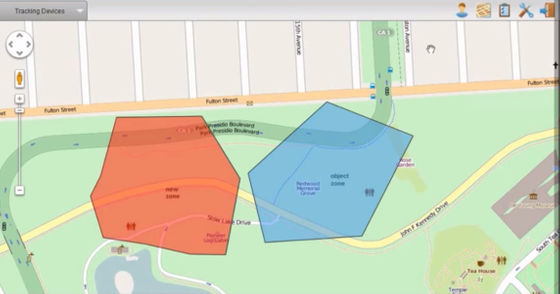Judgment that the use of location information to 'determine all people in a specific area' is unconstitutional

The Chicago District Court ruled that the '
New Federal Court Rulings Find Geofence Warrants Unconstitutional | Electronic Frontier Foundation
https://www.eff.org/deeplinks/2020/08/new-federal-court-rulings-find-geofence-warrants-unconstitutional-0
Feds can't ask Google for every phone in a 100-meter radius, court says | Ars Technica
https://arstechnica.com/tech-policy/2020/09/feds-cant-ask-google-for-every-phone-in-a-100-meter-radius-court-says/
Geofence is a word that refers to an area surrounded by virtual boundaries. Due to the development of smartphone location information technology, it is possible in recent years to grasp the movement route of a person holding a smartphone in detail, so it is possible to identify whether an object has “entered/exited” in the area from the location information. ..

By
If you can figure out who was within a certain range at the time the incident occurred, the investigation would make a lot of progress. Therefore, the police have asked companies with location-based technology to figure out who was inside a particular geofence at a certain time, and have asked companies that handle location information to do this.
Google, which is the first company that handles location information, is the company that is most sought after by location information. According to Google, the number of indexing requests issued to the company from 2017 to 2019 has increased about 90 times, and in 2019 there were 180 requests per week. There has been some debate about the pros and cons of getting the location information of citizens who have not been determined to be criminals from Google by police agencies.
Police ask Google to provide user location information as ``for suspect search''-GIGAZINE

This case concerns the legitimacy of a 'warrant' for Geofence allocation that was filed for the investigation of drug theft cases. Chicago authorities have requested Google to disclose the identifier and location of the device within a particular geofence for an investigation. The applied Geofences were densely populated areas such as restaurants, commercial facilities, clinics, housing estates, swimming pools and gyms.
This is one case in which the Chicago District Court denied the authorities multiple applications for a geofence warrant. The problem with GeoFence warrants is that they 'indiscriminately' acquire location information within a particular GeoFence, and the U.S. Amendment's Fourth Constitution states that 'the warrant is for a substantial reason supported by an oath or affirmation. It must be issued only on the basis of the following and must identify the place to be searched and the person to be arrested or the property to be confiscated' and arrest to investigate the person. There is a good reason to do it.

At the time of the first GeoFence warrant application, the judge in charge rejected the application, saying that 'the scope of the application was too wide' and 'a large number of devices unrelated to the crime were subject to investigation.' Chicago authorities narrowed down the geofence and filed a second application, but rejected again. The authorities further applied for the third time with the condition that 'the device identifier and user data are not charged', but the judge in charge quotes the Ibarra vs. Illinois case, 'the police investigate the bar If you get a warrant, you have the right to investigate the bar, but not the right to investigate guests who may have been at the bar. Even if they do, they are not given the right to investigate anyone who was inside a particular geofence.'
In a series of discussions, the Federal District Court for Chicago has a clear view that 'an investigation that does not involve people unrelated to the criminal case is not permitted .' ``For many years, the court has rejected warrants to investigate everyone in a particular place,'' Judge Gabriel Fuentes, who denied the third application, stated in the Constitution against excessive investigations. He said he should protect his rights.
Related Posts:
in Web Service, Posted by darkhorse_log






